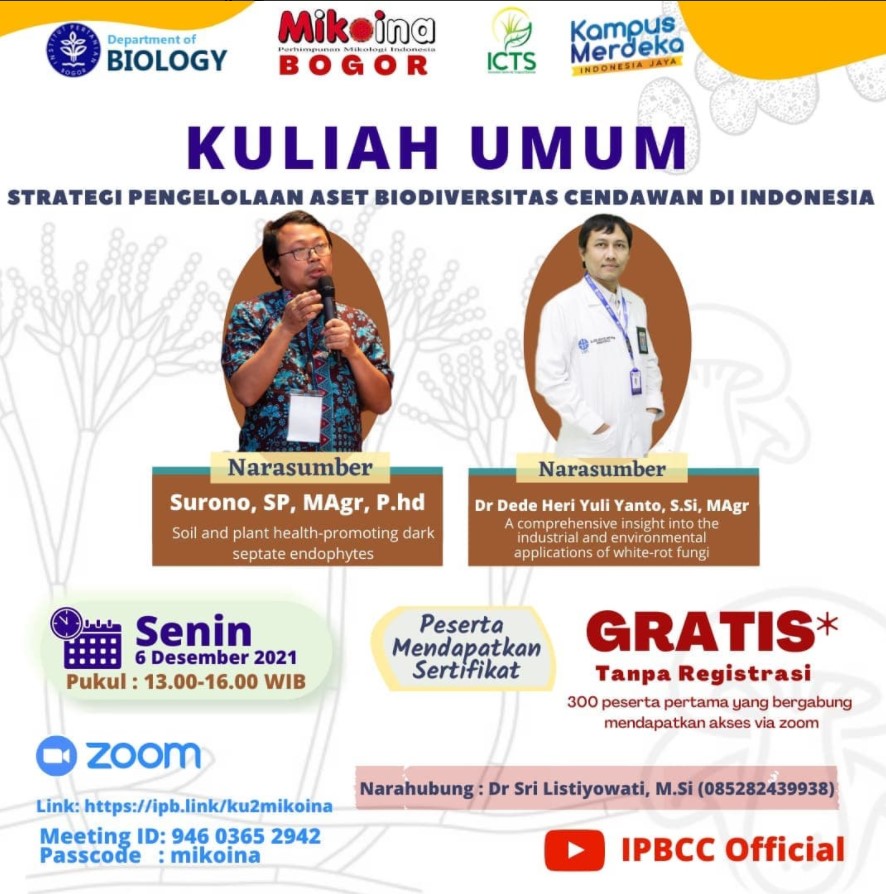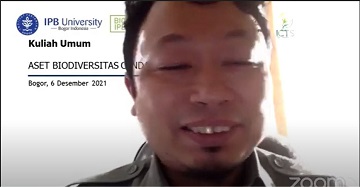News
Department of Biology IPB University Holds General Lecture on Fungal Management
- 11 December 2021
- Last modified at 11 December 2021
Soil fertility is a trend for research and development research. Department of Biology, Faculty of Mathematics and Natural Sciences, IPB University, Mikoina Community Bogor and Indonesian Center for Tropical Sciences held an online public lecture about ‘Strategies for Management of Fungus Biodiversity Assets in Indonesia’ on December 6th.
Head of Soil Biology and Health Research Group at the Soil Research Institute, Surono, said that the interaction between plants and fungi is a symbiotic mutualism. One of these symbiotic activities is the transfer of nutrients.
“Dark Septate Endophytes (DSE) fungi can produce antioxidant compounds, organic acids, phytohorons, and anti-pathogenic compounds. Therefore, fungal technology should be environmentally friendly in order to produce healthy products," he explained.
He conducted research by collecting DSE data from various acid sulfate fields in Indonesia. The use of dark septate endophytic fungi and mycorrhizal fungi has been proven to help plants adapt to heavy metal polluted environments. Fungi are the key to the development of future agriculture that is environmentally friendly.
He hopes that DSE on various food commodities can be investigated further in Eastern Indonesia. Isolates from DSE can later be useful in the agricultural, forestry, and so on.
Head of the Biomaterial Research Group of the National Research and Innovation Agency (BRIN), Dr. Dede Heri Yuli Yanto, explained that white rot fungi degrade lignin and cellulose using liginolytic enzymes. This lignin component is very important in wood commodities.
The sources of lignocellulose are abundant in Indonesia. The large amount causes lignin to be considered as waste.
He said that IPB University students are conducting research on the degradation of exopolysaccharides in mushrooms.
“The production of laccase enzymes does not require expensive costs. In the green industry, laccase enzymes can be used as bioremediation, food industry, synthetic chemicals, pulp and paper, and biorefiners. Laccase enzyme is also used in baking to improve the quality of the dough," he concluded.
Export Article
Share this article
News Archive
Recent News
-
IPB Biology Lecturer Explores Collaboration with NTU Singapore
28 July 2025
-
The 7th Summer Course on Biology
13 January 2025
-
The 6th International Conference on Biosciences (ICoBio) 2025
2 December 2024
-
Condolences on the Passing of Prof. Dr. dr. Sri Budiarti
27 November 2024
-
Congratulations and Success
13 November 2024
-
Condolences on the Passing of drh. Djoko Waluyo, MS, Retired Lecturer of IPB’s Department of Biology
9 November 2024
-
The 4th National Webinar for Enriching Biological Concepts 2024
24 October 2024













































.png)











Login
LoginSitemap
map